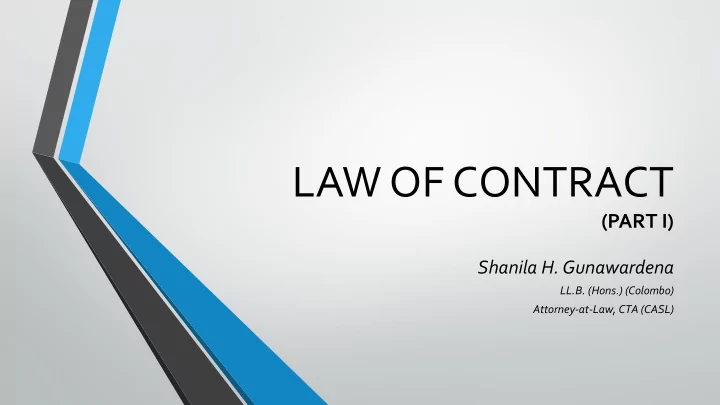

LAW OF CONTRACT (PART I) Shanila H. Gunawardena LL.B. (Hons.) (Colombo) Attorney-at-Law, CTA (CASL)
MAIN COMPONENTS OF A CONTRACT 1. Intention to create legal relations 2. Offer 3. Acceptance 4. Consideration/ reasonable cause 5. Capacity to enter in to a contract
(1) INTENTION TO CREATE LEGAL RELATIONS • An intention which actually exists , or an intention, having regard to all surrounding circumstances, the law will deem to exist in the minds of the parties. • Presumption in favour of legal intention in agreements between business people. • Domestic/social agreements - general rule - no legal intention. Balfour vs. Balfour [1919] 2 KB 571 Jones vs. Padavatton [1969] 1WLR 328 • Exception to the general rule relating to domestic/social agreements
(2) OFFER • An offer is an expression of willingness to contract on certain terms made with the intention that it shall become binding (on the offeror) as soon as it is accepted by the person to whom it is addressed (the offeree). • Requirements of a valid offer. • What is not an offer? “Tradesmen’s Puff”, supply of information, invitations to treat.
Invitations to Treat • An "invitation to treat", is where a party is merely inviting offers, which he is then free to accept or reject. • An invitation to treat is not capable of being accepted and is not intended to be binding. • Examples: tenders, auction sales, display of goods/ price tag, advertisements
Carlill vs. Carbolic Smoke Ball Company [1892] EWCA Civ 1 [England and Wales Court of Appeal (Civil Division) Decisions] • Product of the company - “smoke ball” ; a cure for influenza. • The company published newspapers advertisements claiming that it would pay £100 to anyone who got sick with influenza after using its product according to the instructions provided with it and that £1,000 is deposited with a specified bank, showing their sincerity in the matter. • Mrs. Carlill saw the advertisement, bought one of the balls and used it for nearly two months until she contracted the flu. She claimed £100 from the Company. • The Court of Appeal unanimously held that there was a fully binding contract for £100 with Mrs. Carlill.
Defendant’s arguments to demonstrate the Court’s reasons for rejecting the defendant’s advertisement was a mere invitation to treat arguments rather than an offer 1. The advert was a sales puff and lacked intent 1. The statement referring to the deposit of £1,000 to be an offer. demonstrated intent and therefore it was not a mere sales puff. 2. It is not possible to make an offer to the 2. It is quite possible to make an offer to the world. world. 3. There was no notification of acceptance. 3. In unilateral contracts there is no requirement that the offeree communicates an intention to accept, since acceptance is through full performance. 4. The wording was too vague to constitute an 4. Whilst there may be some ambiguity in the wording offer since there was no stated time limit as to this was capable of being resolved by applying a catching the flu. reasonable time limit or confining it to only those who caught flu whilst still using the balls. 5. There was no consideration provided since 5. The defendants would have value in people using the the 'offer' did not specify that the user of the balls even if they had not been purchased by them balls must have purchased them. directly.
Termination of an Offer • Lapse of time • Offeree’s Rejection • Counter Offer • Death of either party before acceptance • Destruction of subject matter. • Insanity/ Mental Incapacity • Illegality • Revocation of the offer before acceptance • Failure of a condition subject to which the offer was made • Change of status of the offeror
(3) ACCEPTANCE • Offer must still be in force. • Acceptance must be absolute and unqualified. Cannot be subject to conditions, additions, restrictions alterations (counter offer). • Offer becomes irrevocable upon acceptance. • Generally, only the offeree is entitled to accept the offer; not third parties. • Acceptance must be clear and unambiguous. • Acceptance to be in the manner indicated. • Acceptance must be communicated to the offeror. Exceptions apply: silence/inaction • Acceptance can be by express words or by conduct. • Performance in ignorance of an offer. (Rewards)
(3) ACCEPTANCE • Rewards (particularly rewards for information) – Where services rendered in ignorance of the offer fulfill the terms of the offer. Gibbons vs. Proctor (1891) 64 L.T. 594 (England) Allowed a police officer to claim a reward even though he had furnished the required information before the printing of the advertisement offering the reward. No reasons given. Therefore, met severe criticism. Williams vs. Carwardine (1833) 5 C.& P. 566 (England) A person who was aware of the existence of an offer of a reward for information relating to the discovery of a murder, but gave the required information, influenced not by the reward but by other motives, was entitled to the promised reward.
(3) ACCEPTANCE • Rewards (continued) – Contrary view: Fitch vs. Snedaker (1868) 38 N.Y. 248 (America) In conformity with the general principles governing the acceptance of offers, it was held that there could be no assent to an offer by a person unaware of the fact that it had been made. Bloom vs. American Swiss Watch Co. (1915) A.D. 100 (South Africa) An informer furnishing information in ignorance that a reward had been promised was not entitled to recover it.
(3) ACCEPTANCE • Research on the Postal Rule on Acceptance.
Recommend
More recommend